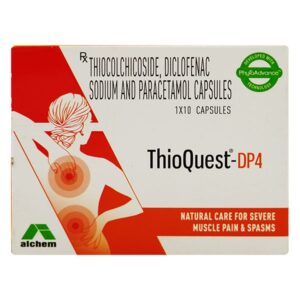THIORIDAZINE + THIOCOLCHICOSIDE
Thioridazine: Thioridazine is an antipsychotic medication primarily used to treat symptoms of psychosis, such as hallucinations, delusions, and disordered thinking. It belongs to a class of drugs known as phenothiazines.
The exact mechanism of action of Thioridazine is not fully understood, but it is thought to work by blocking the action of dopamine, a neurotransmitter in the brain that is associated with psychosis. By blocking dopamine receptors, Thioridazine helps to restore the balance of neurotransmitters in the brain, thereby reducing psychotic symptoms.
The dose of Thioridazine can vary depending on the individual and the condition being treated. Typically, the starting dose for adults is around 50 mg to 100 mg, taken orally two or three times a day. The dose may be gradually increased if necessary, under the supervision of a healthcare professional. It is important to follow the prescribed dose and not exceed it without medical advice.
While Thioridazine can be effective in treating psychosis, it is associated with several potential side effects. Common side effects include drowsiness, dizziness, blurred vision, dry mouth, constipation, and weight gain. It may also cause extrapyramidal symptoms such as muscle stiffness, tremors, and restlessness. Long-term use of Thioridazine has been associated with a rare but potentially serious side effect called tardive dyskinesia, characterized by involuntary movements of the face and body.
Thioridazine can also have significant cardiovascular side effects. It may prolong the QT interval, which can increase the risk of an irregular heart rhythm called torsades de pointes. This risk is higher at higher doses and in patients with a history of heart conditions or electrolyte imbalances. Therefore, regular monitoring of the heart rhythm is important during treatment with Thioridazine.
It is essential to consult a healthcare professional for proper guidance and monitoring while taking Thioridazine. They can provide specific instructions based on a person’s condition and medical history, and help manage any potential side effects that may arise.
Thiocolchicoside: Thiocolchicoside is a muscle relaxant drug that is mainly used to treat acute muscle spasms and stiffness. It is a synthetic derivative of colchicine, a natural compound found in the autumn crocus plant.
The exact mechanism of action of thiocolchicoside is not fully understood, but it is believed to work by inhibiting the release of certain neurotransmitters in the spinal cord, which helps to decrease muscle spasms and promotes muscle relaxation. It also has anti-inflammatory properties that may contribute to its muscle-relaxing effects.
Thiocolchicoside is available in the form of tablets or as a topical gel. The dose and duration of treatment may vary depending on the severity of the muscle spasm and the individual patient. It is usually taken by mouth with or without food, and the recommended starting dose for adults is 8 mg three times a day. However, the dosage may be adjusted by a healthcare professional based on the patient’s response to the treatment.
Like any medication, thiocolchicoside may have side effects. Common side effects include dizziness, drowsiness, nausea, vomiting, diarrhea, stomach pain, headache, and skin rash. These side effects are usually mild and temporary. However, if any severe side effects such as allergic reactions, difficulty breathing, chest pain, or irregular heartbeat occur, immediate medical attention should be sought.
It is important to note that thiocolchicoside is not recommended for use in pregnant women, breastfeeding mothers, or individuals with a known hypersensitivity to colchicine. It should also be used with caution in patients with renal or hepatic impairment.
Overall, Thiocolchicoside is a muscle relaxant drug used to treat acute muscle spasms and stiffness. It works by inhibiting the release of certain neurotransmitters in the spinal cord, reducing muscle spasms and promoting muscle relaxation. It is available in tablet or gel form and may have side effects such as dizziness and drowsiness.

